英语专业导论论文
英语专业导论论文
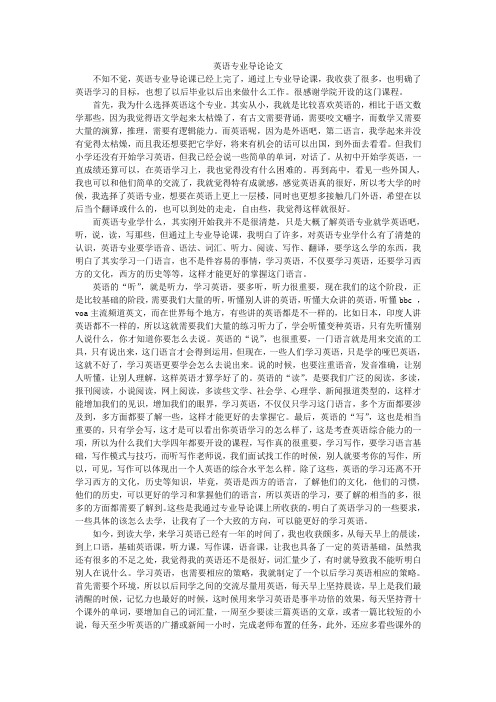
英语专业导论论文不知不觉,英语专业导论课已经上完了,通过上专业导论课,我收获了很多,也明确了英语学习的目标,也想了以后毕业以后出来做什么工作。
很感谢学院开设的这门课程。
首先,我为什么选择英语这个专业。
其实从小,我就是比较喜欢英语的,相比于语文数学那些,因为我觉得语文学起来太枯燥了,有古文需要背诵,需要咬文嚼字,而数学又需要大量的演算,推理,需要有逻辑能力。
而英语呢,因为是外语吧,第二语言,我学起来并没有觉得太枯燥,而且我还想要把它学好,将来有机会的话可以出国,到外面去看看。
但我们小学还没有开始学习英语,但我已经会说一些简单的单词,对话了。
从初中开始学英语,一直成绩还算可以,在英语学习上,我也觉得没有什么困难的。
再到高中,看见一些外国人,我也可以和他们简单的交流了,我就觉得特有成就感,感觉英语真的很好,所以考大学的时候,我选择了英语专业,想要在英语上更上一层楼,同时也更想多接触几门外语,希望在以后当个翻译或什么的,也可以到处的走走,自由些,我觉得这样就很好。
而英语专业学什么,其实刚开始我并不是很清楚,只是大概了解英语专业就学英语吧,听,说,读,写那些,但通过上专业导论课,我明白了许多,对英语专业学什么有了清楚的认识,英语专业要学语音、语法、词汇、听力、阅读、写作、翻译,要学这么学的东西,我明白了其实学习一门语言,也不是件容易的事情,学习英语,不仅要学习英语,还要学习西方的文化,西方的历史等等,这样才能更好的掌握这门语言。
英语的“听”,就是听力,学习英语,要多听,听力很重要,现在我们的这个阶段,正是比较基础的阶段,需要我们大量的听,听懂别人讲的英语,听懂大众讲的英语,听懂bbc ,voa主流频道英文,而在世界每个地方,有些讲的英语都是不一样的,比如日本,印度人讲英语都不一样的,所以这就需要我们大量的练习听力了,学会听懂变种英语,只有先听懂别人说什么,你才知道你要怎么去说。
英语的“说”,也很重要,一门语言就是用来交流的工具,只有说出来,这门语言才会得到运用,但现在,一些人们学习英语,只是学的哑巴英语,这就不好了,学习英语更要学会怎么去说出来。
英语专业论文英语范文推荐(精选4篇)

英语专业论文英语范文推荐(精选4篇)选择英语文学的毕业论文选题可以从三个方向进行:国别文学研究、文学批评理论研究和比较文学研究。
问渠那得清如许,为有源头活水来,本文是勤劳的小编给家人们找到的英语专业论文英语范文推荐【精选4篇】,仅供参考,希望对大家有一些参考价值。
英语小论文800字篇一1.坚强的意志是成功的重要保证。
2.意志坚定的人才能完成伟大的使命,3.学生也是这样,不刻苦学习,终究不会成为有用之才There is an old saying: where there is a will, there is a way. It tells us that a strong will is the most essential quality that anyone who wants to achieve success. It can contribute a lot to one’s success.Although “All roads lead to Rome”, none of them is completely smooth. Our life is filled with obstacles which may make us feel so hopeless that we may choose to give up. At the crucial moment, strong will helps a lot. As a matter of fact, the ability to work through difficult situation and unfortunate events with strong will can make one stronger and more capable. In other words, if we want to realize life’s goal, we must keep forging ahead with strong consciousness.From what has been discussed above, we can see that the establishment of tough determination is of great importance to everyone. With a strong will, including our knowledge, we will be able to deal with any situation in our life. Whatever we do, as long as we stick to and do not give up easily, we will realize the goal at last.英语专业论文模板篇二“魅力新声”英语歌唱比赛不仅具有较高的学术含量,而且包含较浓厚的英语文化。
大学英语专业论文六篇
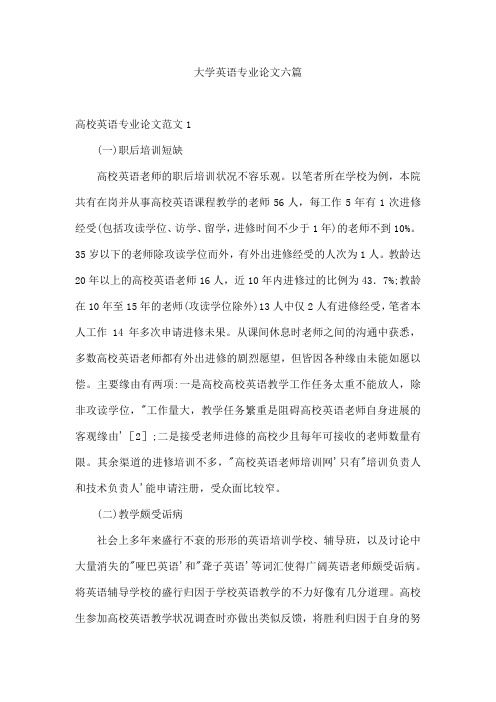
大学英语专业论文六篇高校英语专业论文范文1(一)职后培训短缺高校英语老师的职后培训状况不容乐观。
以笔者所在学校为例,本院共有在岗并从事高校英语课程教学的老师56人,每工作5年有1次进修经受(包括攻读学位、访学、留学,进修时间不少于1年)的老师不到10%。
35岁以下的老师除攻读学位而外,有外出进修经受的人次为1人。
教龄达20年以上的高校英语老师16人,近10年内进修过的比例为43.7%;教龄在10年至15年的老师(攻读学位除外)13人中仅2人有进修经受,笔者本人工作14年多次申请进修未果。
从课间休息时老师之间的沟通中获悉,多数高校英语老师都有外出进修的剧烈愿望,但皆因各种缘由未能如愿以偿。
主要缘由有两项:一是高校高校英语教学工作任务太重不能放人,除非攻读学位,"工作量大,教学任务繁重是阻碍高校英语老师自身进展的客观缘由'[2];二是接受老师进修的高校少且每年可接收的老师数量有限。
其余渠道的进修培训不多,"高校英语老师培训网'只有"培训负责人和技术负责人'能申请注册,受众面比较窄。
(二)教学颇受诟病社会上多年来盛行不衰的形形的英语培训学校、辅导班,以及讨论中大量消失的"哑巴英语'和"聋子英语'等词汇使得广阔英语老师颇受诟病。
将英语辅导学校的盛行归因于学校英语教学的不力好像有几分道理。
高校生参加高校英语教学状况调查时亦做出类似反馈,将胜利归因于自身的努力,而将失败归因于高校英语老师的教学不得法[3]。
此处暂不考虑这样的归因是否合乎规律,但高校英语老师无论如何是脱不了干系的。
首先,绝大多数中学校英语老师是高等教育培育的。
其次,作为"哑巴英语'和"聋子英语'携带者的高校生们刚走出高校校门即被识破,充分说明高校英语的教学质量如何。
再者,为提高高校英语教学质量,21世纪以来,高校英语教学改革的不断推动和是否广泛推广ESP专业英语教学的争辩热点都不约而同地指向高校英语老师专业化进展的必要性和紧迫性。
英语语言学论文六篇
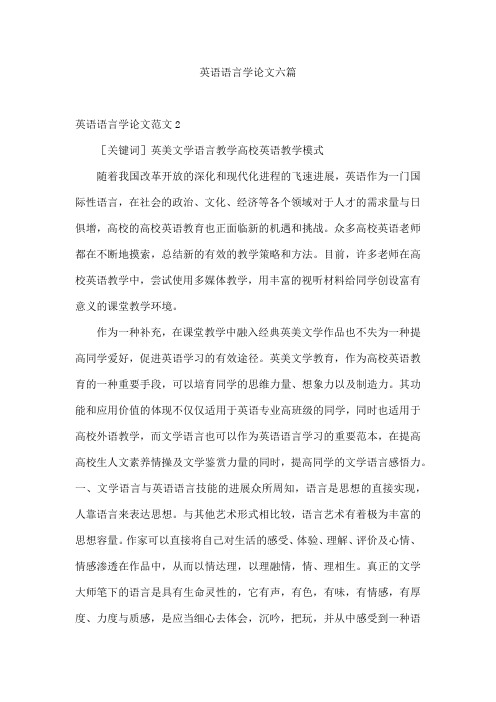
英语语言学论文六篇英语语言学论文范文2[关键词]英美文学语言教学高校英语教学模式随着我国改革开放的深化和现代化进程的飞速进展,英语作为一门国际性语言,在社会的政治、文化、经济等各个领域对于人才的需求量与日俱增,高校的高校英语教育也正面临新的机遇和挑战。
众多高校英语老师都在不断地摸索,总结新的有效的教学策略和方法。
目前,许多老师在高校英语教学中,尝试使用多媒体教学,用丰富的视听材料给同学创设富有意义的课堂教学环境。
作为一种补充,在课堂教学中融入经典英美文学作品也不失为一种提高同学爱好,促进英语学习的有效途径。
英美文学教育,作为高校英语教育的一种重要手段,可以培育同学的思维力量、想象力以及制造力。
其功能和应用价值的体现不仅仅适用于英语专业高班级的同学,同时也适用于高校外语教学,而文学语言也可以作为英语语言学习的重要范本,在提高高校生人文素养情操及文学鉴赏力量的同时,提高同学的文学语言感悟力。
一、文学语言与英语语言技能的进展众所周知,语言是思想的直接实现,人靠语言来表达思想。
与其他艺术形式相比较,语言艺术有着极为丰富的思想容量。
作家可以直接将自己对生活的感受、体验、理解、评价及心情、情感渗透在作品中,从而以情达理,以理融情,情、理相生。
真正的文学大师笔下的语言是具有生命灵性的,它有声,有色,有味,有情感,有厚度、力度与质感,是应当细心去体会,沉吟,把玩,并从中感受到一种语言的趣味性。
因此语言的背后是人的心灵世界。
对文学语言美的敏感与驾驭力量,是提高人的精神境界,使人变得更加美妙的不行或缺的方面。
文学阅读的魅力与意义也就在于此。
目前的高校英语教学,仍旧停留在传统的单纯课文教学,语言点讲解等层面上,课本内容相对陈旧,老师的教学手段也并无创新之处。
其弊端是忽视英语的基本功能即表达功能,也忽视了同学在教学活动中的主体作用,另外还忽视了对同学英语学习爱好的培育,将生硬的课本内容强行“灌输”;至同学脑海中,使整个课堂教学环节缺乏生气,长此以往,高校英语教学将陷入僵局。
英语专业教学实践论文(3篇)
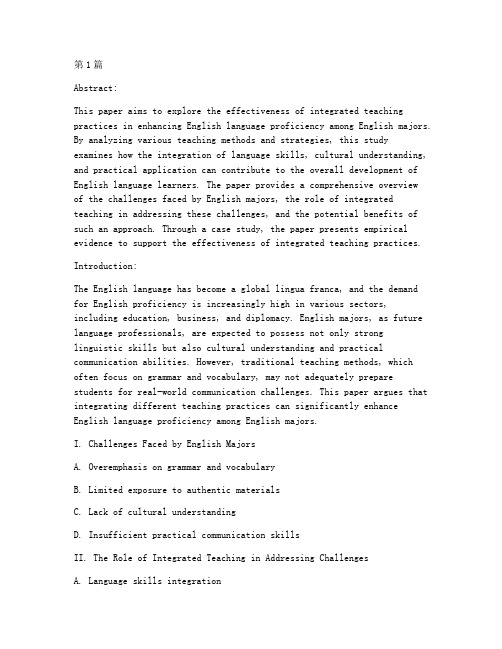
第1篇Abstract:This paper aims to explore the effectiveness of integrated teaching practices in enhancing English language proficiency among English majors. By analyzing various teaching methods and strategies, this study examines how the integration of language skills, cultural understanding, and practical application can contribute to the overall development of English language learners. The paper provides a comprehensive overviewof the challenges faced by English majors, the role of integrated teaching in addressing these challenges, and the potential benefits of such an approach. Through a case study, the paper presents empirical evidence to support the effectiveness of integrated teaching practices.Introduction:The English language has become a global lingua franca, and the demandfor English proficiency is increasingly high in various sectors,including education, business, and diplomacy. English majors, as future language professionals, are expected to possess not only stronglinguistic skills but also cultural understanding and practical communication abilities. However, traditional teaching methods, which often focus on grammar and vocabulary, may not adequately prepare students for real-world communication challenges. This paper argues that integrating different teaching practices can significantly enhance English language proficiency among English majors.I. Challenges Faced by English MajorsA. Overemphasis on grammar and vocabularyB. Limited exposure to authentic materialsC. Lack of cultural understandingD. Insufficient practical communication skillsII. The Role of Integrated Teaching in Addressing ChallengesA. Language skills integration1. Reading, writing, listening, and speaking2. Task-based language teachingB. Cultural understanding1. Cultural awareness and sensitivity2. Cultural competenceC. Practical application1. Real-life scenarios2. Collaborative learningIII. Benefits of Integrated Teaching PracticesA. Enhanced language proficiencyB. Improved cultural understandingC. Increased motivation and engagementD. Preparation for real-world communication challengesIV. Case Study: An Integrated Teaching Approach in an English Major ProgramA. MethodologyB. ResultsC. DiscussionV. ConclusionI. Challenges Faced by English MajorsEnglish majors often encounter several challenges in their language learning journey. One of the primary challenges is the overemphasis on grammar and vocabulary, which may hinder their ability to communicate effectively in real-life situations. Additionally, limited exposure to authentic materials, such as native speakers' conversations andcontemporary texts, may restrict their language acquisition. Furthermore, the lack of cultural understanding can lead to miscommunication and a superficial understanding of the language and its users. Lastly, insufficient practical communication skills may prevent English majors from applying their knowledge in real-world scenarios.II. The Role of Integrated Teaching in Addressing ChallengesTo address these challenges, integrated teaching practices can play a crucial role. By integrating different teaching methods and strategies, English majors can develop a well-rounded skill set that encompasses language skills, cultural understanding, and practical application.A. Language skills integrationIntegrating reading, writing, listening, and speaking skills allows English majors to develop a comprehensive understanding of the language. Task-based language teaching (TBLT) is an effective approach that encourages students to engage in real-life communication tasks,fostering the development of all language skills simultaneously.B. Cultural understandingCultural understanding is essential for effective communication. By promoting cultural awareness and sensitivity, English majors can avoid cultural misunderstandings and develop cultural competence, which is crucial for interacting with diverse groups of people.C. Practical applicationPractical application is vital for the development of communication skills. By incorporating real-life scenarios and collaborative learning activities, English majors can practice their language skills in a supportive environment and prepare for future communication challenges.III. Benefits of Integrated Teaching PracticesIntegrated teaching practices offer several benefits for English majors:A. Enhanced language proficiencyBy integrating different teaching methods, English majors can develop a more comprehensive understanding of the language, leading to enhanced language proficiency.B. Improved cultural understandingCultural understanding is crucial for effective communication. Integrated teaching practices can help English majors develop cultural awareness and sensitivity, which is essential for interacting with diverse groups of people.C. Increased motivation and engagementAn integrated approach to teaching can increase students' motivation and engagement by providing a variety of learning experiences and making the learning process more enjoyable and relevant.D. Preparation for real-world communication challengesIntegrated teaching practices can prepare English majors for real-world communication challenges by equipping them with the necessary skills and knowledge to navigate diverse cultural contexts and communication scenarios.IV. Case Study: An Integrated Teaching Approach in an English Major ProgramThis section presents a case study of an integrated teaching approach implemented in an English major program. The study involves a group of 30 English majors who were taught using a combination of language skills integration, cultural understanding, and practical application.A. MethodologyThe study employed a mixed-methods approach, including surveys, interviews, and observations. Data were collected to assess the effectiveness of the integrated teaching approach in enhancing language proficiency and cultural understanding.B. ResultsThe results indicated that the integrated teaching approachsignificantly improved the language proficiency and cultural understanding of the English majors. Students reported higher levels of engagement and motivation, as well as an increased ability to communicate effectively in diverse cultural contexts.C. DiscussionThe findings of the case study support the effectiveness of integrated teaching practices in enhancing English language proficiency among English majors. The study highlights the importance of integrating language skills, cultural understanding, and practical application in the teaching of English.V. ConclusionIn conclusion, integrated teaching practices can significantly enhance English language proficiency among English majors. By addressing the challenges faced by students and incorporating a variety of teaching methods, English majors can develop a well-rounded skill set that prepares them for real-world communication challenges. This paper has demonstrated the effectiveness of integrated teaching practices through a case study and provides a comprehensive overview of the benefits of such an approach. As language professionals, English majors should be equipped with the necessary skills and knowledge to thrive in a globalized world, and integrated teaching practices can play a vital role in achieving this goal.第2篇Abstract:This paper presents a case study of an English language teaching practice implemented in a higher education setting. The study explores the effectiveness of integrating various teaching methods and technologies to enhance students' English language proficiency. Through the analysis of student performance, teacher reflections, and feedback from the students, the paper evaluates the outcomes of the integratedteaching approach and provides insights into the challenges and benefits of implementing such strategies in the English language classroom.Introduction:The demand for English language proficiency has surged globally, with English becoming the lingua franca in various domains such as business, science, and technology. In higher education, English language courses play a crucial role in preparing students for international communication and academic pursuits. However, traditional teaching methods often struggle to keep up with the dynamic nature of language learning and the diverse needs of students. This paper aims to investigate the effectiveness of an integrated teaching approach that combines various methods and technologies to enhance English language proficiency in a university setting.Literature Review:Previous research has highlighted the importance of integratingdifferent teaching methods to cater to diverse learning styles and enhance language acquisition. Some studies have shown that a combination of communicative, task-based, and technology-assisted language learning approaches can significantly improve students' language skills (Harmer, 2007; Nunan, 1991). Additionally, the use of technology in language learning has been found to promote autonomy, motivation, and engagement (Richards & Rodgers, 2001).Methodology:The study was conducted in a public university in China, involving a sample of 50 English language students enrolled in an intermediate-level course. The participants were divided into two groups: an experimental group that received integrated teaching and a control group that followed the traditional teaching method. The integrated teaching approach included the following components:1. Communicative language teaching (CLT): Focus on interaction and communication through pair and group work activities.2. Task-based language learning (TBL): Use of authentic tasks that require students to use English in real-life contexts.3. Technology-assisted language learning (TALL): Incorporation ofdigital tools such as online platforms, multimedia resources, and educational apps.4. Flipped classroom: Students engage with online content outside the classroom, allowing for more interactive and personalized learning during class time.Data collection methods included pre- and post-tests to measurestudents' language proficiency, teacher reflections on the implementation of the integrated approach, and student feedback on their learning experiences. The data were analyzed using descriptivestatistics and content analysis.Results:The results of the study indicated that the experimental group, which received integrated teaching, demonstrated significant improvements in their English language proficiency compared to the control group. The post-test scores of the experimental group were higher than those of the control group in all areas assessed, including listening, speaking, reading, and writing. Teacher reflections highlighted the positive impact of the integrated approach on student engagement and motivation, as well as the challenges of managing diverse learning needs and technology integration.Student feedback revealed that the integrated teaching approach was effective in enhancing their language skills and promoting a more dynamic and interactive learning environment. Students particularly appreciated the use of technology, which allowed them to access resources and practice language skills outside the classroom.Discussion:The findings of this study support the effectiveness of an integrated teaching approach in enhancing English language proficiency. Thecombination of communicative, task-based, and technology-assisted language learning methods provides a comprehensive and engaging learning experience that caters to diverse learning styles and needs. The use of technology not only facilitates language learning but also encourages autonomy and self-regulation.However, the study also identified several challenges associated with implementing an integrated teaching approach. Teacher training and support are essential to ensure the effective use of technology and to address the diverse needs of students. Additionally, the availability of resources and infrastructure can be limiting factors in some settings.Conclusion:This case study demonstrates the potential of an integrated teaching approach in enhancing English language proficiency in higher education. The findings suggest that combining various teaching methods and technologies can lead to significant improvements in students' language skills and learning experiences. However, the successful implementation of such an approach requires careful planning, ongoing teacher development, and adequate resources. Future research should explore the long-term effects of integrated teaching practices and the beststrategies for scaling up such initiatives in diverse educational settings.References:Harmer, J. (2007). The practice of English language teaching (4th ed.). Essex: Pearson Education Limited.Nunan, D. (1991). Language teaching methodology: A textbook for teachers. Hertfordshire: Prentice Hall International.Richards, J. C., & Rodgers, T. S. (2001). Approaches and methods in language teaching (2nd ed.). Cambridge: Cambridge University Press.第3篇Abstract:This paper presents a case study on the effectiveness of integrative teaching practices in an English major program. Through a comprehensive analysis of the teaching methods, curriculum design, and student outcomes, this study aims to explore how an integrative approach can enhance English language proficiency. The paper is structured into three main sections: an introduction, a literature review, and a discussion of the findings. The conclusion summarizes the key insights andimplications for English language teaching.Introduction:The English language has become a global lingua franca, and proficiency in English is essential for academic, professional, and personal development. In response to this demand, English major programs have been developed worldwide. However, traditional teaching methods, which often focus on language skills in isolation, have been criticized for their limitations in fostering genuine language proficiency. This paper investigates the impact of integrative teaching practices on English language proficiency in an English major program.Literature Review:1. Integrative Teaching ApproachIntegrative teaching, as defined by Nation (2001), involves the combination of language skills, such as reading, writing, listening, and speaking, in a holistic manner. This approach emphasizes the interconnectedness of language skills and encourages learners to engage with the language in a meaningful and contextually relevant way.2. Benefits of Integrative TeachingResearch has shown that integrative teaching practices can lead to several benefits, including improved language proficiency, increased motivation, and enhanced critical thinking skills (Johnson & Johnson, 1989; Nation, 2001). Additionally, integrative teaching allows for a more authentic learning experience, as learners are exposed to a variety of language contexts and tasks.3. Curriculum DesignCurriculum design plays a crucial role in the implementation of integrative teaching practices. A well-designed curriculum should include a diverse range of activities that promote language skill integration, such as collaborative projects, cross-disciplinary courses, and real-world language tasks (Richards & Rodgers, 2001).Discussion of Findings:1. Teaching MethodsIn the English major program under study, a variety of teaching methods were employed to foster integrative language learning. These included project-based learning, collaborative tasks, and the use of technology. For instance, students were encouraged to work in groups to research and present on a topic related to their major, thereby enhancing their reading, writing, speaking, and listening skills.2. Curriculum DesignThe curriculum in the English major program was designed to promote integrative language learning. It included courses such as English for Specific Purposes (ESP), English for Academic Purposes (EAP), and cross-cultural communication. These courses aimed to prepare students for various real-world language demands, such as academic writing, professional communication, and cultural understanding.3. Student OutcomesThe study revealed that students who engaged in integrative teaching practices showed significant improvements in their English language proficiency. Specifically, students demonstrated higher scores in standardized language tests, such as the Test of English as a Foreign Language (TOEFL) and the International English Language Testing System (IELTS). Moreover, students reported increased confidence in their language abilities and a greater appreciation for the interconnectedness of language skills.Conclusion:This case study has demonstrated that integrative teaching practices can effectively enhance English language proficiency in an English major program. By combining language skills, employing a diverse range of teaching methods, and designing a curriculum that promotes integrative language learning, English language teachers can help students achieve a more authentic and comprehensive understanding of the language. The findings of this study have implications for English language teaching, suggesting that integrative approaches should be prioritized in curriculum design and classroom practice.References:Johnson, D. W., & Johnson, R. T. (1989). Cooperation and competition: Theory and research. Edina, MN: Interaction Book Co.Nation, I. (2001). Language curriculum design. New York: Routledge.Richards, J. C., & Rodgers, T. S. (2001). Approaches and methods in language teaching (2nd ed.). Cambridge: Cambridge University Press.。
英语专业论文(5篇)
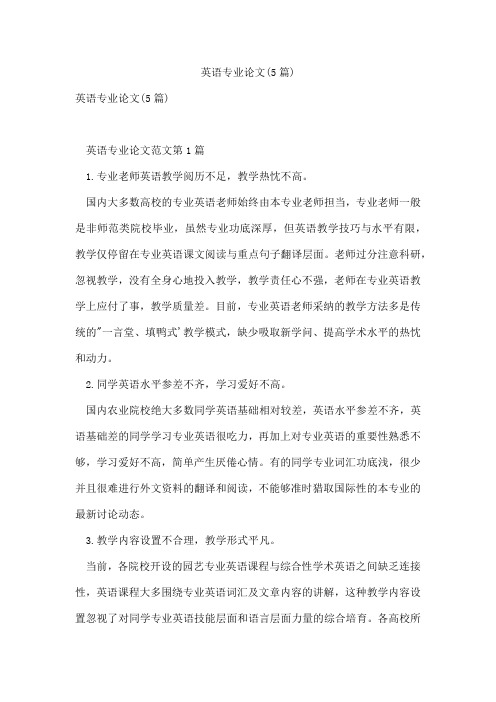
英语专业论文(5篇)英语专业论文(5篇)英语专业论文范文第1篇1.专业老师英语教学阅历不足,教学热忱不高。
国内大多数高校的专业英语老师始终由本专业老师担当,专业老师一般是非师范类院校毕业,虽然专业功底深厚,但英语教学技巧与水平有限,教学仅停留在专业英语课文阅读与重点句子翻译层面。
老师过分注意科研,忽视教学,没有全身心地投入教学,教学责任心不强,老师在专业英语教学上应付了事,教学质量差。
目前,专业英语老师采纳的教学方法多是传统的"一言堂、填鸭式'教学模式,缺少吸取新学问、提高学术水平的热忱和动力。
2.同学英语水平参差不齐,学习爱好不高。
国内农业院校绝大多数同学英语基础相对较差,英语水平参差不齐,英语基础差的同学学习专业英语很吃力,再加上对专业英语的重要性熟悉不够,学习爱好不高,简单产生厌倦心情。
有的同学专业词汇功底浅,很少并且很难进行外文资料的翻译和阅读,不能够准时猎取国际性的本专业的最新讨论动态。
3.教学内容设置不合理,教学形式平凡。
当前,各院校开设的园艺专业英语课程与综合性学术英语之间缺乏连接性,英语课程大多围绕专业英语词汇及文章内容的讲解,这种教学内容设置忽视了对同学专业英语技能层面和语言层面力量的综合培育。
各高校所用的教材主要有自选原版英文教材和自行选编教材两种形式,自编教材内容编排过于古板、陈旧,还有的教材内容难度偏高或者涉及的专业内容过于简洁,不能满意专业要求。
再有,各高校通常采纳传统的"填鸭式'教学模式,偏重于老师的讲解,教学内容枯燥,教学形式单一,忽视了同学的主动性和制造性,同学学习的乐观性不高,同学只是被动接受学问。
这种教学形式比较死板,同学无法参加到教学过程中,扼杀了同学的学习爱好与英语语感的培育,最终导致我国专业英语缺乏创新性的局面。
二、本项园艺专业英语教学改革特色与成效在园艺专业英语教学实践中尝试了一系列园艺专业英语教学改革并取得了肯定成效,详细改革如下。
英语专业导论3000字

走过高考的独木桥,我踏入了大学这个小社会。
很多freshman都以为自己从地狱得到解脱来到了可以随心所欲的天堂,以为来了大学就是睡到自然醒,课想去就去,考试水水就能过,可以天天刷剧撸游戏,就这么平庸的度过四年。
然而,是他们想多了。
这样的大学生活,只会培养出一群啃老族,一群找不找工作的空有文凭的低能大学生。
这四段专业导论课的视频犹醍醐灌顶,令我幡然醒悟,我越来越意识到我们不是为了读大学而读大学,我们来这里是为了学习的,是为了将来的工作的,带着这样的目的去度过大学生活,自然收获很大,甚至日后找工作也能从中受益。
人生在世,不是为平庸而活,这世界要那么多一模一样的普通人干什么。
我们要做的是干一番自己的大事业,退一步说,我们也得活出自己,活得精彩。
敢于拼搏的人生才能算是真正的人生。
从小我的语言类学科就是强项,因而来到了宁大英语系也能算作是如我所愿。
我们现在学习的英语专业的知识还没有细分学习方向,主要包括英语阅读与写作、综合英语、英语语音、英语听力和英语口语五门课程。
这些应该都是在初步训练我们的听说读写译的能力,即反应能力记忆力和分析力、表达能力和口才、阅读方法和词汇量、表达能力和语感、思维方式和反应能力,继而为大二的细分学习方向打下坚实的基础和做好充足的准备。
大二细分学习方向之后,英语专业大致分为了四个小门类:商务、翻译、英语语言文学和英语师范。
到了大三我们甚至还有机会选择第二外语,学习一门全新的语言。
我相信,在五位优秀老师的教导下,通过大一的系统性地学习,我的英语可以取得一定的进步,适应英语专业的学习节奏,进而在将来的学习生活中做得更出色,从而更好地实现我的目标和理想。
我在开头就提到大学是个小社会,的确,它并非我们想象中的象牙塔,所以,我们应该从现在起就对自己的未来有一个清醒的认识,确立一个奋斗的方向,树立好自己的目标,这样才能对准方向努力拼搏,从而实现人生价值。
由于我现在刚大一,其实并不清楚自己究竟对哪个方面感兴趣,一直在商务和翻译之间纠结徘徊。
关于英语语言学论文免费参考例文
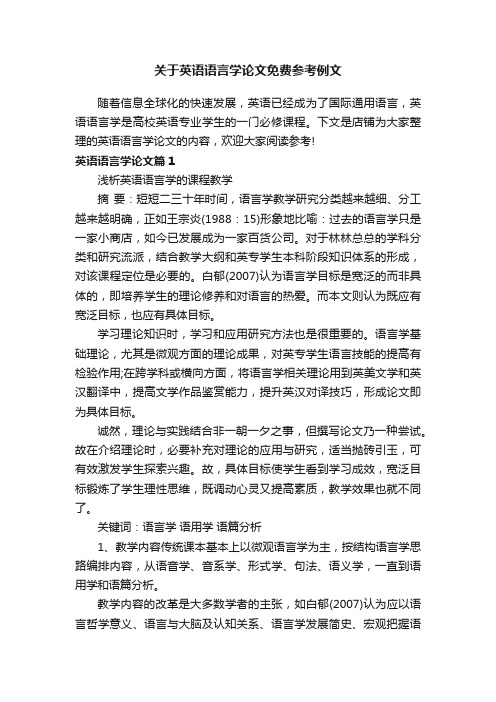
关于英语语言学论文免费参考例文随着信息全球化的快速发展,英语已经成为了国际通用语言,英语语言学是高校英语专业学生的一门必修课程。
下文是店铺为大家整理的英语语言学论文的内容,欢迎大家阅读参考!英语语言学论文篇1浅析英语语言学的课程教学摘要:短短二三十年时间,语言学教学研究分类越来越细、分工越来越明确,正如王宗炎(1988:15)形象地比喻:过去的语言学只是一家小商店,如今已发展成为一家百货公司。
对于林林总总的学科分类和研究流派,结合教学大纲和英专学生本科阶段知识体系的形成,对该课程定位是必要的。
白郁(2007)认为语言学目标是宽泛的而非具体的,即培养学生的理论修养和对语言的热爱。
而本文则认为既应有宽泛目标,也应有具体目标。
学习理论知识时,学习和应用研究方法也是很重要的。
语言学基础理论,尤其是微观方面的理论成果,对英专学生语言技能的提高有检验作用;在跨学科或横向方面,将语言学相关理论用到英美文学和英汉翻译中,提高文学作品鉴赏能力,提升英汉对译技巧,形成论文即为具体目标。
诚然,理论与实践结合非一朝一夕之事,但撰写论文乃一种尝试。
故在介绍理论时,必要补充对理论的应用与研究,适当抛砖引玉,可有效激发学生探索兴趣。
故,具体目标使学生看到学习成效,宽泛目标锻炼了学生理性思维,既调动心灵又提高素质,教学效果也就不同了。
关键词:语言学语用学语篇分析1、教学内容传统课本基本上以微观语言学为主,按结构语言学思路编排内容,从语音学、音系学、形式学、句法、语义学,一直到语用学和语篇分析。
教学内容的改革是大多数学者的主张,如白郁(2007)认为应以语言哲学意义、语言与大脑及认知关系、语言学发展简史、宏观把握语言学真正意义等四方面为重。
还有学者认为增加课外阅读材料以改进教学内容,如王扬(2004)和吴格奇(2005)主张选用有助于学生理解基本理论、概念的材料、辅之以拓宽视野的补充材料。
还有以宏观还是微观语言学内容作为教学重点的争论:“微观”派认为语言内部分支是语言学的基础内容,课时分配比重要大;“宏观”派认为基础部分简单,学生可自学,重点应是宏观介绍;“中间”派是既注重基础又考虑涉猎面。
- 1、下载文档前请自行甄别文档内容的完整性,平台不提供额外的编辑、内容补充、找答案等附加服务。
- 2、"仅部分预览"的文档,不可在线预览部分如存在完整性等问题,可反馈申请退款(可完整预览的文档不适用该条件!)。
- 3、如文档侵犯您的权益,请联系客服反馈,我们会尽快为您处理(人工客服工作时间:9:00-18:30)。
英语专业导论论文
不知不觉,英语专业导论课已经上完了,通过上专业导论课,我收获了很多,也明确了英语学习的目标,也想了以后毕业以后出来做什么工作。
很感谢学院开设的这门课程。
首先,我为什么选择英语这个专业。
其实从小,我就是比较喜欢英语的,相比于语文数学那些,因为我觉得语文学起来太枯燥了,有古文需要背诵,需要咬文嚼字,而数学又需要大量的演算,推理,需要有逻辑能力。
而英语呢,因为是外语吧,第二语言,我学起来并没有觉得太枯燥,而且我还想要把它学好,将来有机会的话可以出国,到外面去看看。
但我们小学还没有开始学习英语,但我已经会说一些简单的单词,对话了。
从初中开始学英语,一直成绩还算可以,在英语学习上,我也觉得没有什么困难的。
再到高中,看见一些外国人,我也可以和他们简单的交流了,我就觉得特有成就感,感觉英语真的很好,所以考大学的时候,我选择了英语专业,想要在英语上更上一层楼,同时也更想多接触几门外语,希望在以后当个翻译或什么的,也可以到处的走走,自由些,我觉得这样就很好。
而英语专业学什么,其实刚开始我并不是很清楚,只是大概了解英语专业就学英语吧,听,说,读,写那些,但通过上专业导论课,我明白了许多,对英语专业学什么有了清楚的认识,英语专业要学语音、语法、词汇、听力、阅读、写作、翻译,要学这么学的东西,我明白了其实学习一门语言,也不是件容易的事情,学习英语,不仅要学习英语,还要学习西方的文化,西方的历史等等,这样才能更好的掌握这门语言。
英语的“听”,就是听力,学习英语,要多听,听力很重要,现在我们的这个阶段,正是比较基础的阶段,需要我们大量的听,听懂别人讲的英语,听懂大众讲的英语,听懂bbc ,voa主流频道英文,而在世界每个地方,有些讲的英语都是不一样的,比如日本,印度人讲英语都不一样的,所以这就需要我们大量的练习听力了,学会听懂变种英语,只有先听懂别人说什么,你才知道你要怎么去说。
英语的“说”,也很重要,一门语言就是用来交流的工具,只有说出来,这门语言才会得到运用,但现在,一些人们学习英语,只是学的哑巴英语,这就不好了,学习英语更要学会怎么去说出来。
说的时候,也要注重语音,发音准确,让别人听懂,让别人理解,这样英语才算学好了的。
英语的“读”,是要我们广泛的阅读,多读,报刊阅读,小说阅读,网上阅读,多读些文学、社会学、心理学、新闻报道类型的,这样才能增加我们的见识,增加我们的眼界,学习英语,不仅仅只学习这门语言,多个方面都要涉及到,多方面都要了解一些,这样才能更好的去掌握它。
最后,英语的“写”,这也是相当重要的,只有学会写,这才是可以看出你英语学习的怎么样了,这是考查英语综合能力的一项,所以为什么我们大学四年都要开设的课程,写作真的很重要,学习写作,要学习语言基础,写作模式与技巧,而听写作老师说,我们面试找工作的时候,别人就要考你的写作,所以,可见,写作可以体现出一个人英语的综合水平怎么样。
除了这些,英语的学习还离不开学习西方的文化,历史等知识,毕竟,英语是西方的语言,了解他们的文化,他们的习惯,他们的历史,可以更好的学习和掌握他们的语言,所以英语的学习,要了解的相当的多,很多的方面都需要了解到。
这些是我通过专业导论课上所收获的,明白了英语学习的一些要求,一些具体的该怎么去学,让我有了一个大致的方向,可以能更好的学习英语。
如今,到读大学,来学习英语已经有一年的时间了,我也收获颇多,从每天早上的晨读,到上口语,基础英语课,听力课,写作课,语音课,让我也具备了一定的英语基础,虽然我还有很多的不足之处,我觉得我的英语还不是很好,词汇量少了,有时就导致我不能听明白别人在说什么。
学习英语,也需要相应的策略,我就制定了一个以后学习英语相应的策略。
首先需要个环境,所以以后同学之间的交流尽量用英语,每天早上坚持晨读,早上是我们最清醒的时候,记忆力也最好的时候,这时候用来学习英语是事半功倍的效果,每天坚持背十个课外的单词,要增加自己的词汇量,一周至少要读三篇英语的文章,或者一篇比较短的小说,每天至少听英语的广播或新闻一小时,完成老师布置的任务,此外,还应多看些课外的
书籍,虽然我不是很喜欢看书,我喜欢看小说,现在,我在尝试着看英文小说,虽然现在对于我来说有点困难,不管是意义上,还是词汇上,我读书的过程中,才发现我有好多的词汇都不知道意思,去查字典呢,又太多了。
现在在这个英语专业,学的其实很少,我们学的一些只有与我们专业有关的,所以这需要我们自己去关注一些基本的信息,一些有用的知识,在各个方面都能懂一些,学英语的就应该是这样的,现在英语那么的普及,一些人多多少少都懂一些英文,甚至一些人的英文还很好,虽然他不是英语专业的,我们拿什么跟别人理工类的人啊那些竞争,要靠我们在英语方面的专业知识,还要靠些我们涉及广泛的知识。
学习英语专业,就要达到学习这个专业的要求,这样我们毕业后才能找到一个比较好的工作。
而我以后,想当个翻译,最好是笔译,或者在一个外企工作,这就是我的打算。
所以,这需要我这四年的勤奋和努力,从现在开始,就需要我更认真的学习了,希望四年以后,不留下什么遗憾,找到个好的工作,或在英语学习上能更上一层楼。
Welcome !!! 欢迎您的下载,资料仅供参考!。
